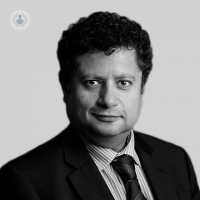Extreme pain: glossopharyngeal neuralgia
Autore:Glossopharyngeal neuralgia (GPN) is an extreme stabbing, burning or electric shock type of pain that can last from a few seconds up to a couple of minutes. The pain is connected to the ninth cranial nerve (also known as the glossopharyngeal nerve), which is one of 12 nerves in the brain. This nerve is connected to the brainstem at the upper medulla and travels through the back of the throat, tongue, tonsil and ear, which is why intense attacks of pain are felt in these areas.

Leading consultant neurosurgeon Professor Keyoumars Ashkan from the London Neurosurgery Partnership explains more…
What are the causes of GPN?
GPN usually affects people over the age of 50. Often, the cause is unknown and is diagnosed as irritation. Abnormalities may occur where the nerve signal is disrupted, which causes abnormal signals to pass through the nerve and ultimately causes severe pain. Other possible causes are:
- Tumour
- Infection in the mouth area that affects the glossopharyngeal nerve
- Blood vessels or growths compressing the nerve
- Multiple sclerosis
What are the symptoms and triggers?
The symptoms of GPN include really intense pain in the ear, tonsil area, back of the tongue and nose and usually only one side of the throat. It is intermittent and sporadic and can last from a few seconds up to a couple of minutes. It can also get more frequent and painful over time. Some people describe the pain as the worst pain they have ever experienced.
Sometimes people who experience this pain are able to notice certain triggers that bring on the pain. This is an extremely helpful way to help manage the pain by avoiding the triggers. Some of the triggers may be:
- Chewing
- Swallowing
- Talking
- Yawning
- Laughing
- Coughing
- Sneezing
How is GPN diagnosed?
To diagnose GPN a doctor will begin by going through your medical history and current symptoms you are experiencing. A physical examination may also take place where a cotton-tipped swab will touch the back of your throat. This is performed to see if you experience any pain. If there is pain then some local anaesthetic will be applied and the doctor will try again. If the anaesthetic works and you cannot feel the pain then it is likely you have GPN.
Other ways of diagnosing glossopharyngeal neuralgia are by performing an MRI or sometimes a CT scan.
How is GPN treated?
To treat GPN your doctor may want to try a conservative route first of call. Anti-convalescent drugs like carbamazepine, oxcarbazepine, gabapentin, or phenytoin may be prescribed to see if they help neutralise the pain.
Microvascular decompression is an option for more permanent relief but is usually a last resort if other methods have not worked. This is performed to stop the compression between the blood vessel and the nerve root and is done by placing a sponge between them.
Firstly, a craniotomy will be performed by making a small incision behind the ear and drilling a 1-inch opening in the occipital bone. The dura (a protective sheet that covers the brain) is moved to expose the brain.
Once the glossopharyngeal nerve is found, a Teflon sponge is permanently placed in between the glossopharyngeal nerve and blood vessel to reduce the compression. The dura is then closed with sutures and the skull opening closed with small screws in place. The skin is then sutured together and the dressing is placed.
What happens after GPN surgery?
You will spend a couple of days in the hospital recovering and will be assessed by your surgeon and nurses before discharge. Recovery will take a couple of weeks but this can be in the comfort of your own home. A follow-up appointment will be made to check your wound and see if the surgery has worked.
Do not hesitate to book an appointment with a specialist at the London Neurosurgery Partnership.


